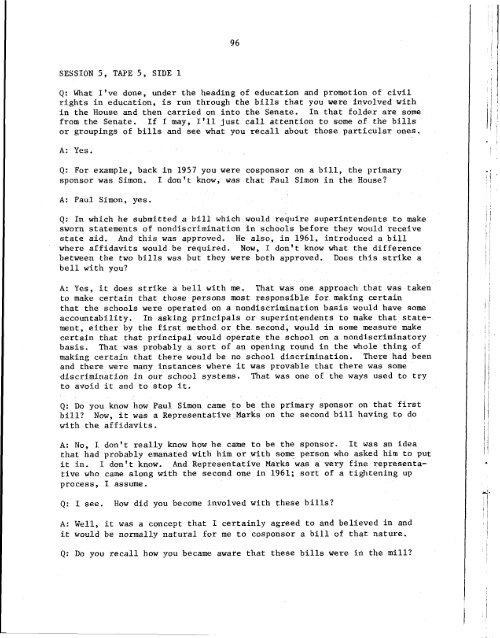Cecil A. Partee Memoir - University of Illinois Springfield
Cecil A. Partee Memoir - University of Illinois Springfield
Cecil A. Partee Memoir - University of Illinois Springfield
Create successful ePaper yourself
Turn your PDF publications into a flip-book with our unique Google optimized e-Paper software.
SESSION 5, TAPE 5, SIDE 1<br />
Q: What I've done, under the heading <strong>of</strong> education and promotion <strong>of</strong> civil<br />
rights in education, is run through the bills that you were involved with<br />
in the House and then carried on into the Senate. In that folder are some<br />
from the Senate. If 1 may, I'll just call attention to some <strong>of</strong> the bills<br />
or groupings <strong>of</strong> bills and see what you recall about those particular ones.<br />
A: Yes.<br />
Q: For example, back in 1957 you were cosponsor on a bill, the primary<br />
sponsor was Simon. I dnn't know, was that Paul Simon in the House?<br />
A: Paul Simon, yes.<br />
Q: In which he submitted a bill which would require superintendents to make<br />
sworn statements <strong>of</strong> nondiscrimination in schools before they would receive<br />
state aid. And this was approved. He also, in 1961, introduced a bill<br />
where affidavits would be required. Now, I don't know what the difference<br />
between the two bills was but they were both approved. Does this strike a<br />
bell with you?<br />
A: Yes, it does strike a bell with me. That was one approach that was taken<br />
to make certain that those persons most responsible for making certain<br />
that the schools were operated on a nondiscrimination basis would have some<br />
accountability. In asking principals ar superintendents to make that statement,<br />
either by the first method or the second, would in some measure make<br />
certain that that principal would operate the school on a nondiscriminatory<br />
basis. That was probably a sort <strong>of</strong> an opening round in the whole thing <strong>of</strong><br />
making certain that there would be no school discrimination. There had been<br />
and there were many instances where it was provable that there was some<br />
discrimination in our school systems. That was one <strong>of</strong> the ways used to try<br />
to avoid it and to stop it.<br />
Q: Do you know how Paul Simon came to be the primary sponsor on that first<br />
bill? Now, it was a Representative Marks on the second bill having t~ do<br />
with the affidavits.<br />
A: No, I. don't really know how he came to be the sponsor. It was an idea<br />
that had probably emanated with him or with some person who asked him to put<br />
it in. I don't know. And Representative Marks was a very fine representative<br />
who came along with the second one in 1961; sort <strong>of</strong> a tightening up<br />
process, I assume.<br />
Q: I see. How did you become involved with these bills?<br />
A: Well, it was a concept that I certainly agreed to and believed in and<br />
it would be normally natural for me to cosponsor a bill <strong>of</strong> that nature.<br />
Q: Do you recall how you became aware that these bills were in the mill?
















